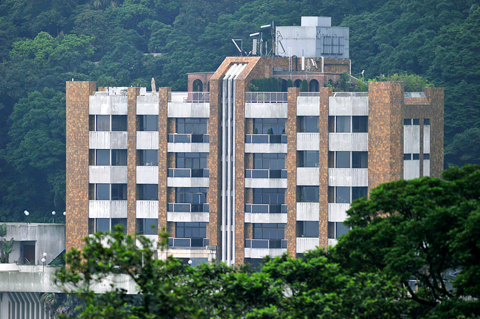One of Hong Kong’s richest tycoons has paid about US$233 million for a property in the Peak area, confounding hopes of a cool-down in the real estate market.
Henderson Land Development (恆基地產) chairman Lee Shau-kee (李兆基) paid HK$68,229 (US$8,750) per square foot (0.09m²) for the site in the Peak’s Barker Road at a public auction, said real-estate services firm Jones Lang LaSalle, which organized the sale on Tuesday.
The 82-year-old’s son, Martin Lee (李家誠), made light of the price tag for the site in one of Hong Kong’s most exclusive neighborhoods.

PHOTO: AFP
“The price is reasonable but it is not something bought for money,” he was quoted as saying by the South China Morning Post.
“Even if you are willing to spend a fortune, you may not be able to get something you fancy. We will build three or four two-to-three story houses for our family to live in,” he said.
In February, Forbes listed Lee Shau-kee as Hong Kong’s second-richest person, with a net worth of US$19 billion, behind Cheung Kong Holdings (長江實業) chief Li Ka-shing (李嘉誠).
Henderson Land set an Asian record in October last year when it sold a duplex in the territory for HK$71,280 per square foot.
The latest sale comes a week after Hong Kong said efforts to cool the territory’s property market showed signs of working, following a lackluster response to a sale of land near the airport.

MORE VISITORS: The Tourism Administration said that it is seeing positive prospects in its efforts to expand the tourism market in North America and Europe Taiwan has been ranked as the cheapest place in the world to travel to this year, based on a list recommended by NerdWallet. The San Francisco-based personal finance company said that Taiwan topped the list of 16 nations it chose for budget travelers because US tourists do not need visas and travelers can easily have a good meal for less than US$10. A bus ride in Taipei costs just under US$0.50, while subway rides start at US$0.60, the firm said, adding that public transportation in Taiwan is easy to navigate. The firm also called Taiwan a “food lover’s paradise,” citing inexpensive breakfast stalls

US PUBLICATION: The results indicated a change in attitude after a 2023 survey showed 55 percent supported full-scale war to achieve unification, the report said More than half of Chinese were against the use of force to unify with Taiwan under any circumstances, a survey conducted by the Atlanta, Georgia-based Carter Center and Emory University found. The survey results, which were released on Wednesday in a report titled “Sovereignty, Security, & US-China Relations: Chinese Public Opinion,” showed that 55.1 percent of respondents agreed or somewhat agreed that “the Taiwan problem should not be resolved using force under any circumstances,” while 24.5 percent “strongly” or “somewhat” disagreed with the statement. The results indicated a change in attitude after a survey published in “Assessing Public Support for (Non)Peaceful Unification

PLUGGING HOLES: The amendments would bring the legislation in line with systems found in other countries such as Japan and the US, Legislator Chen Kuan-ting said Democratic Progressive Party (DPP) Legislator Chen Kuan-ting (陳冠廷) has proposed amending national security legislation amid a spate of espionage cases. Potential gaps in security vetting procedures for personnel with access to sensitive information prompted him to propose the amendments, which would introduce changes to Article 14 of the Classified National Security Information Protection Act (國家機密保護法), Chen said yesterday. The proposal, which aims to enhance interagency vetting procedures and reduce the risk of classified information leaks, would establish a comprehensive security clearance system in Taiwan, he said. The amendment would require character and loyalty checks for civil servants and intelligence personnel prior to

The China Coast Guard has seized control of a disputed reef near a major Philippine military outpost in the South China Sea, Beijing’s state media said, adding to longstanding territorial tensions with Manila. Beijing claims sovereignty over almost all of the South China Sea and has waved away competing assertions from other countries as well as an international ruling that its position has no legal basis. China and the Philippines have engaged in months of confrontations in the contested waters, and Manila is taking part in sweeping joint military drills with the US which Beijing has slammed as destabilizing. The Chinese coast guard